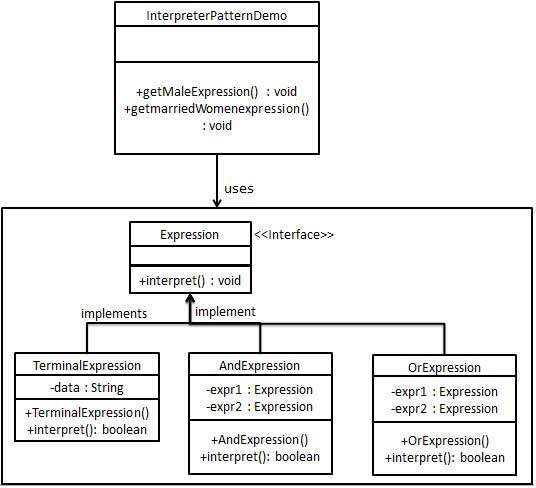
Creational Design Patterns
- Design Patterns - Factory Pattern
- Abstract Factory Pattern
- Design Patterns - Singleton Pattern
- Design Patterns - Builder Pattern
- Design Patterns - Prototype Pattern
Structural Design Patterns
- Design Patterns - Adapter Pattern
- Design Patterns - Bridge Pattern
- Design Patterns - Filter Pattern
- Design Patterns - Composite Pattern
- Design Patterns - Decorator Pattern
- Design Patterns - Facade Pattern
- Design Patterns - Flyweight Pattern
- Design Patterns - Proxy Pattern
- Chain of Responsibility Pattern
Behavioral Design Patterns
- Design Patterns - Command Pattern
- Design Patterns - Interpreter Pattern
- Design Patterns - Iterator Pattern
- Design Patterns - Mediator Pattern
- Design Patterns - Memento Pattern
- Design Patterns - Observer Pattern
- Design Patterns - State Pattern
- Design Patterns - Strategy Pattern
- Design Patterns - Template Pattern
- Design Patterns - Visitor Pattern
J2EE Design Patterns
- Design Patterns - Null Object Pattern
- Design Patterns - MVC Pattern
- Business Delegate Pattern
- Composite Entity Pattern
- Data Access Object Pattern
- Front Controller Pattern
- Intercepting Filter Pattern
- Service Locator Pattern
- Transfer Object Pattern
Design Patterns Useful Resources
Design Patterns - Interpreter Pattern
Interpreter pattern provides a way to evaluate language grammar or expression. This type of pattern comes under behavioral pattern. This pattern involves implementing an expression interface which tells to interpret a particular context. This pattern is used in SQL parsing, symbol processing engine etc.
Implementation
We are going to create an interface Expression and concrete classes implementing the Expression interface. A class TerminalExpression is defined which acts as a main interpreter of context in question. Other classes OrExpression, AndExpression are used to create combinational expressions.
InterpreterPatternDemo, our demo class, will use Expression class to create rules and demonstrate parsing of expressions.

Step 1
Create an expression interface.
Expression.java
package com.tutorialspoint;
public interface Expression {
public boolean interpret(String context);
}
Step 2
Create concrete classes implementing the above interface.
TerminalExpression.java
package com.tutorialspoint;
public class TerminalExpression implements Expression {
private String data;
public TerminalExpression(String data){
this.data = data;
}
@Override
public boolean interpret(String context) {
if(context.contains(data)){
return true;
}
return false;
}
}
OrExpression.java
package com.tutorialspoint;
public class OrExpression implements Expression {
private Expression expr1 = null;
private Expression expr2 = null;
public OrExpression(Expression expr1, Expression expr2) {
this.expr1 = expr1;
this.expr2 = expr2;
}
@Override
public boolean interpret(String context) {
return expr1.interpret(context) || expr2.interpret(context);
}
}
AndExpression.java
package com.tutorialspoint;
public class AndExpression implements Expression {
private Expression expr1 = null;
private Expression expr2 = null;
public AndExpression(Expression expr1, Expression expr2) {
this.expr1 = expr1;
this.expr2 = expr2;
}
@Override
public boolean interpret(String context) {
return expr1.interpret(context) && expr2.interpret(context);
}
}
Example - Usage of Interpreter Pattern
InterpreterPatternDemo uses Expression class to create rules and then parse them.
InterpreterPatternDemo.java
package com.tutorialspoint;
public class InterpreterPatternDemo {
//Rule: Robert and John are male
public static Expression getMaleExpression(){
Expression robert = new TerminalExpression("Robert");
Expression john = new TerminalExpression("John");
return new OrExpression(robert, john);
}
//Rule: Julie is a married women
public static Expression getMarriedWomanExpression(){
Expression julie = new TerminalExpression("Julie");
Expression married = new TerminalExpression("Married");
return new AndExpression(julie, married);
}
public static void main(String[] args) {
Expression isMale = getMaleExpression();
Expression isMarriedWoman = getMarriedWomanExpression();
System.out.println("John is male? " + isMale.interpret("John"));
System.out.println("Julie is a married women? " + isMarriedWoman.interpret("Married Julie"));
}
}
interface Expression {
public boolean interpret(String context);
}
class TerminalExpression implements Expression {
private String data;
public TerminalExpression(String data){
this.data = data;
}
@Override
public boolean interpret(String context) {
if(context.contains(data)){
return true;
}
return false;
}
}
class OrExpression implements Expression {
private Expression expr1 = null;
private Expression expr2 = null;
public OrExpression(Expression expr1, Expression expr2) {
this.expr1 = expr1;
this.expr2 = expr2;
}
@Override
public boolean interpret(String context) {
return expr1.interpret(context) || expr2.interpret(context);
}
}
class AndExpression implements Expression {
private Expression expr1 = null;
private Expression expr2 = null;
public AndExpression(Expression expr1, Expression expr2) {
this.expr1 = expr1;
this.expr2 = expr2;
}
@Override
public boolean interpret(String context) {
return expr1.interpret(context) && expr2.interpret(context);
}
}
Output
Verify the output.
John is male? true Julie is a married women? true